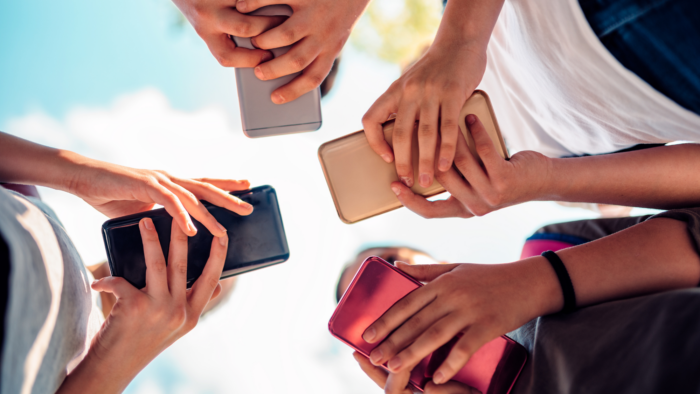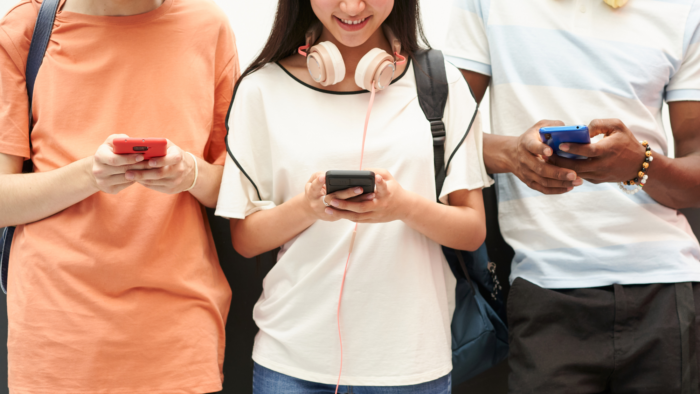Protecting Learning Spaces by Limiting Cell Phones
Great Hearts Academies July 23, 2024 -
In recent news, several schools and district across Arizona have announced a ban on cell phone use during school hours in an effort to reduce distractions in the classroom. While this is making significant media attention, keeping students free from distractions such as texting and scrolling social media has been a staple for Great Hearts academies from the beginning, over two decades ago.
At that time, the primary function of cell phones was to place calls or clumsily send messages using nine-digit numeric keys. “We knew that students didn’t need to use cell phones individually and could instead use the phones in our office for emergencies, illness, or essential communication,” explained Great Hearts Arizona Superintendent, Brandon Crowe. “With the explosion of apps, search engine access, it only reinforced our belief that students needed a time away from these devices – however helpful or useful some might be – to give focused attention to their peers, instructors, and material they studied. We’ve never once regretted it. The dawn of social media, infinite scrolling, and online bullying has only deepened our commitment to an environment free from the distractions awaiting us in our cell phones. This doesn’t mean it’s easy to enforce or that all students appreciate the policy at all times, but it is good and puts the emphasis on the right things – learning and human connection. It might be the only place they have both all day.”
In a published study, Louis-Phillipe Beland and Richard Murphy found that dozens of high schools in the United Kingdom that instituted bans on mobile phones saw significant improvement in test scores. The authors of the study argued that the effects of banning mobile phones added roughly the equivalent of an hour of learning to each school week.
In another study, findings by UNESCO (United Nations Educational, Scientific, and Cultural Organization) revealed that while it may only take a student 10 seconds to respond with a thumbs up emoji, their brain will need 20 minutes to refocus on the lesson in front of them
While these studies make an impressive case for prohibiting devices at school, Great Hearts Co-Founder, Dan Scoggin highlighted that the decision was made to make space for greater endeavors at the academies. “We don’t allow cell phones in our classrooms because we want students to get beyond screens to reflect on what is lasting: deeper relationships with the human beings in front of them and the great, classical conversation of what it means be a human being.”
In limiting cell phone use during class time, Great Hearts has found its students have the space for greater joy. The academies have always ascribed to the principle that sometimes less is more. Policies are set on what goes into the classroom with the following question in mind, “Is this going to contribute meaningful to our shared purpose together, or will it distract from our shared purpose?”
Great Hearts Chief People Office, Jerilyn Olson shared that the long-standing policy is directed by Great Hearts’ commitment to intentional human formation in the academies. “Our school policies have always been very carefully crafted to protect the environment of learning and community.” Olson explained that the policy was never intended to be severely rigid or stern. “We simply know that students have plenty of access to technology in their daily lives. What they rarely have access to is a wealthy of beautiful and lasting things. It is our job to preserve a sacred place of learning and meaningful human connection – to do this is to honor the heart of who we are as humans.”
While some might see these rules as limiting their freedom, Great Hearts sees these disciplines as building the capacity for freedom. They seek to protect the spaces where habits can form, and prudence can develop before giving back to students these technological tools. In this, students are ultimately more free to make wise choices with these tools in their everyday lives.
Olson said it is key to understand that this is not about keeping something from students that they enjoy because Great Hearts thinks it is inherently bad or thought of as the enemy. “The key to this kind of policy is to create an environment where the discipline of focus is lovingly practiced and the enjoyment of other goods celebrated,” she said. “We hope that our students will come to love their community spaces so much that they don’t have much use for distracting devices during these hours.”
Crowe spoke to the safety concerns that often come up when cell phone limitations are imposed at schools. “Our policy is not that phones cannot be on campus, but that they must remain off and in a student’s locker during the school day.” Crowe explained that students who must make a call or check an important email or notification (e.g., from a doctor, a prospective college, an employer), can arrange to do so in the front office or with school leadership. “Our safety protocols require adult staff to be present with students. School staff have devices and means of official communication to notify school leadership and colleagues of emergencies and receive notifications. We’ve not encountered a situation in which hundreds of students carrying cell phones would serve to de-escalate an emergency.”
Do you have a story or know of a story that you would like to see featured at Great Hearts? Please contact jason.moore@greathearts.org.
Please see the Great Hearts policies on cell phones below:
CELL PHONES AND PERSONAL TECHNOLOGY
The use of cell/smart phones, and smart watches during the school day is prohibited. The reason for such a prohibition is to promote an uninterrupted academicenvironment. The Academy has a compelling interest in keeping students not just physically present on campus, but mentally and emotionally present as well, and the ways in which use of phones and social media encourage detachment from real persons and conversations are a commonplace. The ways in which technology can aid and abet academic dishonesty are a growing concern for college and high school educators nationwide, and while a great many schools, districts, and institutions of higher education have entirely given up on restricting personal tech use in any venue, Great Hearts academies holds that it is essential to the proper formation of the young to place limitations on it.
While the ubiquity of personal technology is a given, the following restrictions/allowances apply at the school:
- A student should keep a cell phone turned off (not merely silenced, but off) and cell phones must be stored in their locker during the school day. Cell phones may not be brought in pockets or purses into classrooms.
- Cell phone use is permitted on campus after school and only in the school office area or outside the building.
- If a student needs to phone a parent/guardian during the school day, the student must come to the school office to use one of the school’s phones. In rare cases in which parents/guardians need to get an emergency message to a student before the end of the school day, they should call the school’s main telephone line and ask for a message to be delivered. Parents/guardians should be mindful that texts or other messages that they send directly to the student during the school day are to be picked up only after school dismissal.
- Violation of the above restrictions will result in confiscation of the cell phone and disciplinary action. Cell phones will be turned in to the school office and released only to parents/guardians after confiscation.
ELECTRONIC DEVICES AND OTHER PROHIBITED ITEMS
iPods or other portable music players, cameras, electronic games, iPads/tablets, laser pointers, skateboards, roller blades, wireless/Bluetooth earbuds, and other toys that are not part of the academic or extracurricular program are prohibited on campus.

